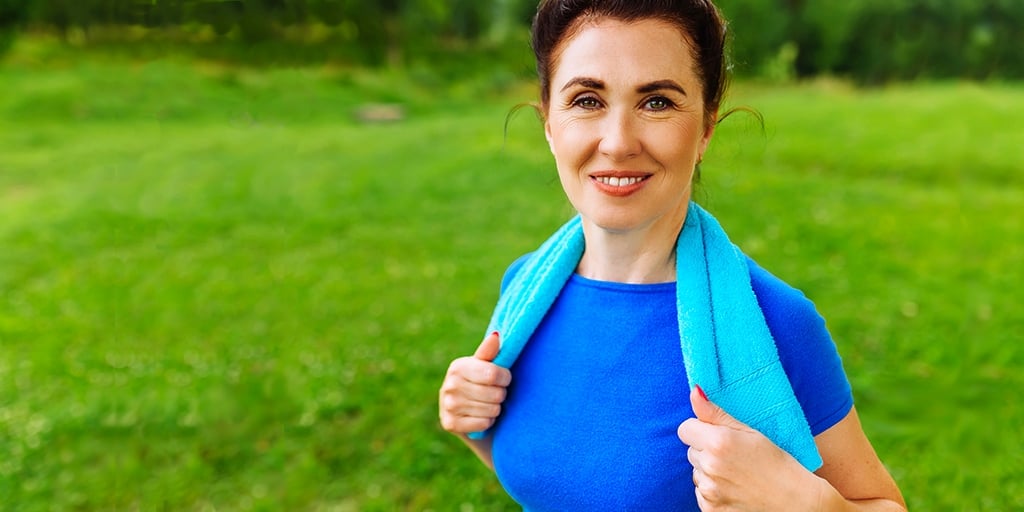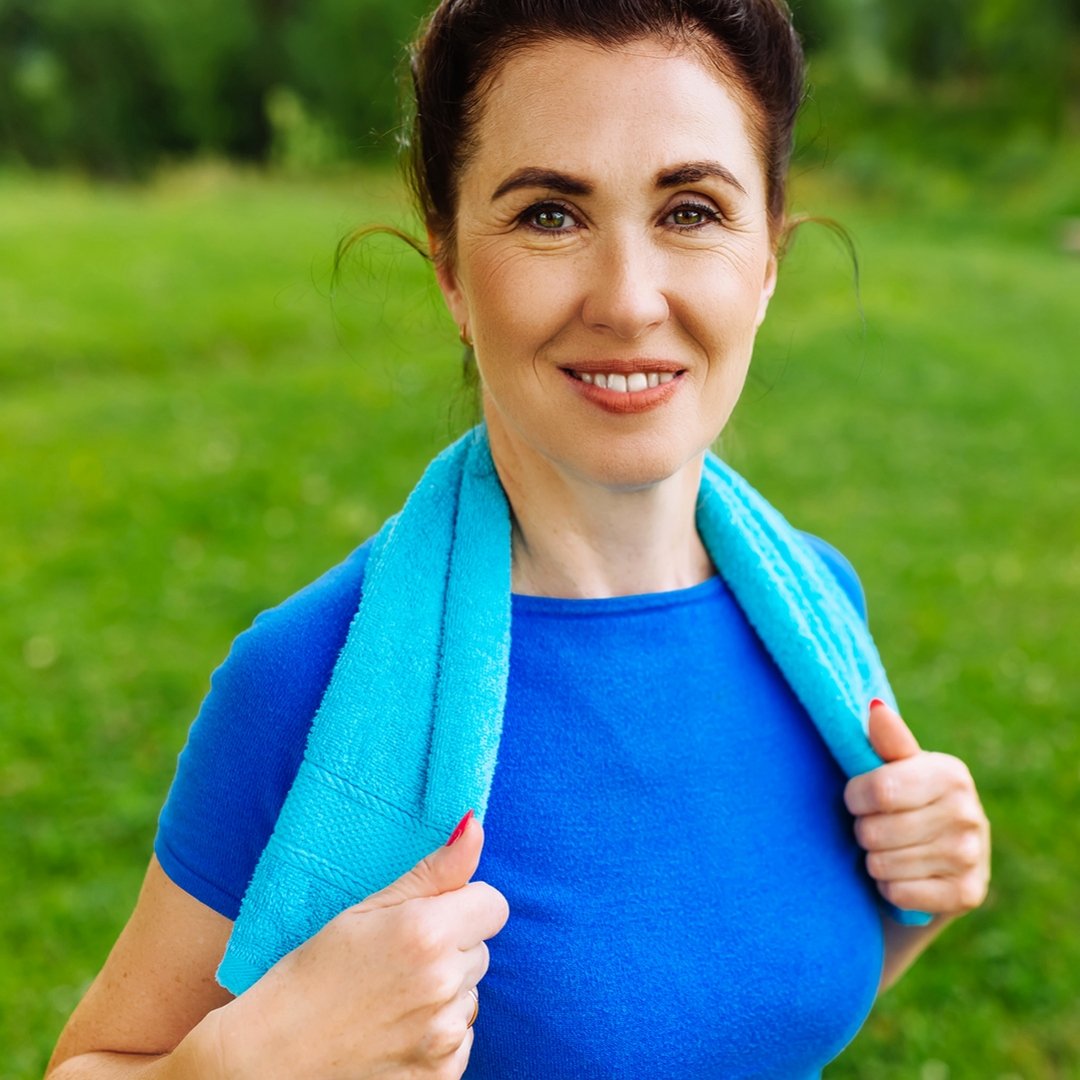
Rose Folsom borrows some tips from physical training to help us build spiritual strength in the New Year.
St. Paul likened a virtuous life to an athletic event:
I have competed well; I have finished the race; I have kept the faith. (2 Timothy 4:7)
Virtue muscles
He’s right that growing a bicep has a lot in common with growing a virtue. Virtues are habits of doing the right thing that have become second nature. And the only way to build a habit is to, well, do something over and over until it causes joy rather than resistance. Until it feels wrong to do it the old way.
A few weeks ago, I let my exercise routine slip. I’m no Simone Biles, but I do a little aerobics, take long walks, and ride my bike. And I’m a huge fan of stretching every day. With no exercise, I started to feel flabby and weak and, worst of all, felt my motivation for exercise slipping away with my muscle tone. But after returning to aerobics class, I felt joyful and optimistic.
Then I took a nap. I was worn out, but it only took one “yes” to get back on track!
Our virtue muscles can weaken in the same way. If we’ve let our spiritual discipline slip a bit (most of us have been there!), and with it, our motivation to exert ourselves in patience, forgiveness, and generosity, we need to get back into the race.
There are seven aspects of physical training that we can use to get holier: strength, nutrition, flexibility, speed, agility, injury prevention, and balance. Let’s see how they can jump-start our spiritual life for the New Year.
Strength
In virtue training, strength of will to do the right thing makes everything else possible. If we haven’t made up our minds that we want to be happier, freer, and more joyful (and that it’s worth the sacrifice to lose habits that don’t serve us anymore), then we’ll never get off the starting blocks.
Let’s start with four things that help build the core strength of will that moves us to want friendship with God:
The Sacrament of Confession is the ultimate detox. Telling Jesus the ways we’ve distanced ourselves from Him and asking for his healing opens our souls to the grace He is waiting to give us.
Pray. Tell God about your successes and failures and then listen to Him.
Read about those who are strong in virtue—the saints.
Hang out with people who think growing in holiness is important. Support each other and pray for each other. Start a book group. Plan a regular phone call with a buddy.
Nutrition
What a swimmer eats and drinks can make the difference between making the team or not. We can train as hard as anyone else, but if what we eat makes us lethargic and flabby, we can kiss the gold medal goodbye.
Same with the pursuit of virtue—it’s good to notice what makes our will strong to do good, and what makes our mind drift off track, and adjust our diet of conversations, videos, books, thoughts, and actions accordingly.
If we write down the shows and movies we’ve watched, books we’ve read, and look honestly at our conversations and thoughts—and bring that list to prayer, God will move our hearts to let go of what leads us from him. Approaching this nutrition inventory fearlessly and prayerfully yields a great payoff of freedom from unhelpful habits.
Flexibility
A gymnast knows that stretching is slightly painful if you’re doing it right. Flexibility in virtue means stretching your desires to match what is right, even if it’s not always comfortable.
A priest told me recently that a good way to minimize self-will is to ask a family member or co-worker how they think something should be done, and then to do it their way—especially when I think my way is the “right” way.
Did I say stretching is slightly painful sometimes?
Speed
An old proverb goes, “He who gives quickly gives twice.” Doing the right thing without hesitating is a sign of mastery in virtue.
I have a habit of putting off doing generous things because whatever I’m offering seems inadequate, and then I don’t do it. But then I think of the Christmas my neighbor arrived at our door with a loaf of Italian bread from the bakery. I was so touched, it still warms my heart, years later.
It turns out it is the thought that counts, not the cost of the gift.

Agility
A tennis player has to be ready for a ball coming from any direction at varying speeds at any moment. We never know what life will bring next, so we need to be familiar with the virtues in our toolbox and develop a habit of putting the right ones to use in each circumstance.
Injury Prevention
A hurdler with strong and flexible muscles is less prone to injury. Our souls will be less prone to sin if we’ve had good virtue-training, and if we do sin, the injury is likely to be less serious.
I used to cheat on my taxes in a tiny business I ran decades ago, before I was Catholic. I figured if I could get away with it, why not? My dishonest actions injured me by taking me farther from God. I was growing my pride, not my virtue, putting myself at even greater risk of injury to my soul.
When I re-discovered the good God and by His grace grew in my desire to be like Him, I gained protection from mortal injury to my soul (or jail time!).
Balance
A boxer needs good balance so he doesn’t get knocked down when he gets hit unexpectedly. An upright person does not easily fall when tempted because she thinks about right and wrong before she acts. She’s practiced not letting emotions rule her behavior. And she asks God for his guidance every day.
For example, when a thought comes into my mind that I want to get back at someone I’m frustrated with (which happens embarrassingly often), I can laugh it off by reminding myself, “That’s just a garden-variety temptation that I don’t have to act on.”
The more we develop our core strengths, the more we see that God’s got this and we’re free to come along for the joy-ride!
Copyright 2023 Rose Folsom
Images: Deposit Photos; licensed by author
About the Author

Rose Folsom
Rose is a convert and Lay Dominican whose background as solopreneur and supervisor makes her passionate about helping professionals live virtues like humility and perseverance so they can ditch imposter syndrome and perfectionism while fully living their faith at work. Grab Rose's latest tips for growing in virtue at VirtueConnection.com.


.png?width=1806&height=731&name=CatholicMom_hcfm_logo1_pos_871c_2728c%20(002).png)
Comments